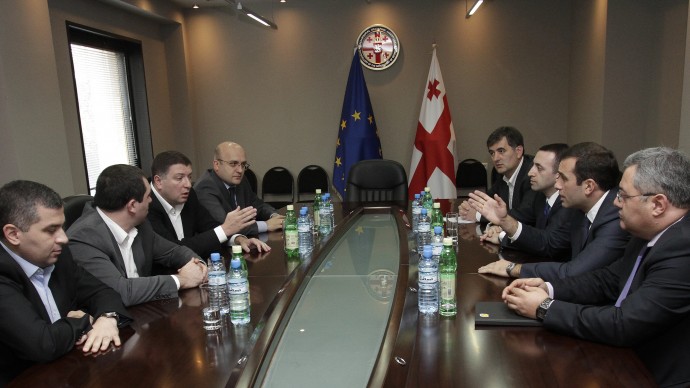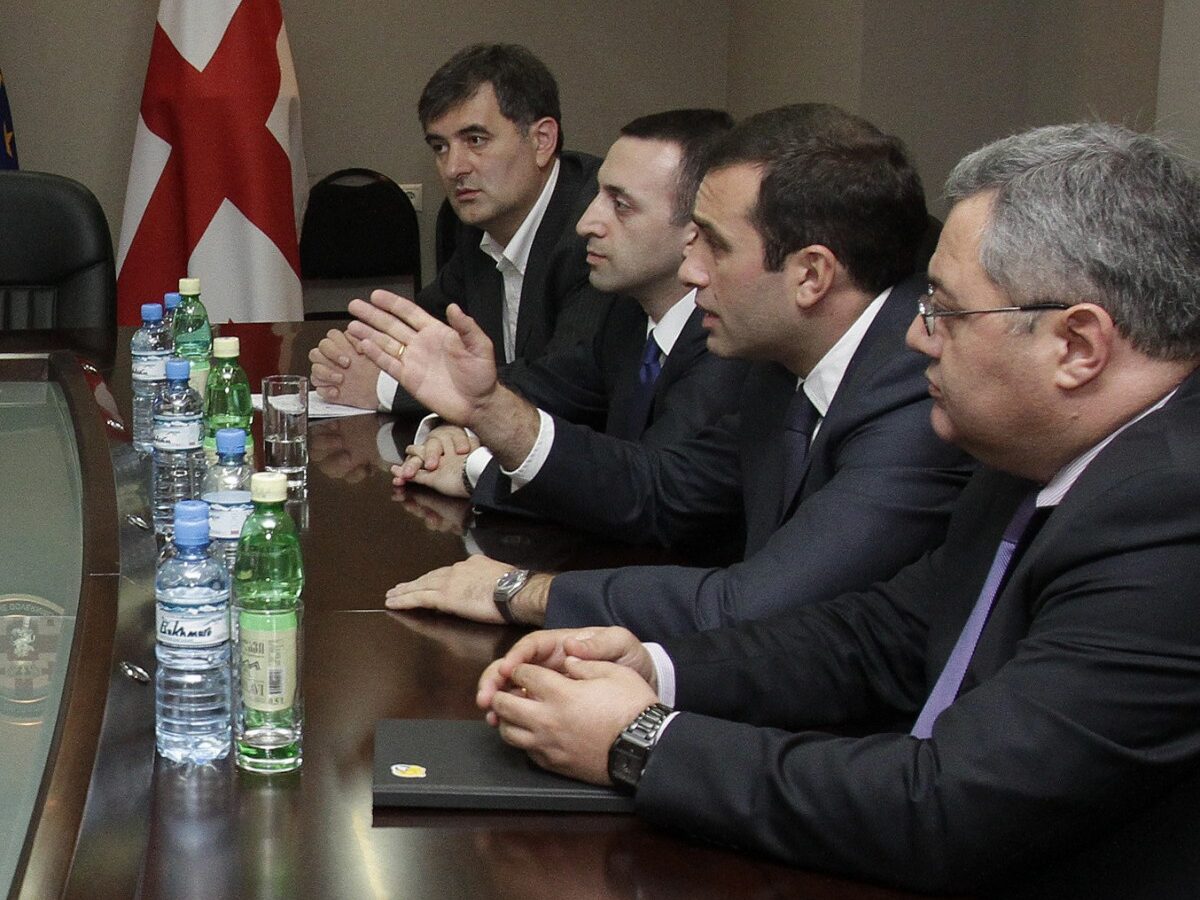
(MintPress) – The Georgian Dream coalition, an opposition political bloc, successfully unseated President Mikheil Saakashvili’s party this month in what some have called the first peaceful political transition in Georgia’s history. The Georgia Dream coalition, headed by billionaire businessman Bidzina Ivanishvili, captured a majority of the 150 seat parliament.
The true test, however, will come next year when presidential elections will be held. Saakashvili, the unpopular president of Georgia could run for re-election even though his party now occupies a minority of seats in the parliament.
Saakashvili has been an ally to the U.S., one of Washington’s strategic partners in the fight against terrorism and separatist movements in Chechnya, Abkhazia and other volatile regions in Southern Russia. While the U.S. has expressed concern over Georgia’s crackdown on free speech and political protest, the country has robust oil and natural gas reserves which could lead the Tbilisi to strengthen ties with Western countries.
Election results
The incumbent Saakashvili will remain in office until elections next year. However, constitutional changes will transfer much of President Saakashvili’s power to the new prime minister, Bidzina Ivanishvili.
Irakli Kakabadze, a conflict resolution scholar and political activist, returned to Georgia, the country of his birth, to observe elections and connect with colleagues. “There was a huge electoral turnout. People were very enthusiastic. However, it wasn’t necessarily a vote of confidence for Ivanishvili, but more a vote against Saakishvili,” said Kakabadze in a recent interview with MintPress.
Although many Georgians are skeptical of Ivanishvili, the population by and large signaled its discontent with a hegemonic regime that used secret police, intimidation and torture to silence opposition.
“This represents a very strong rejection of the neoliberal autocracy,” added Kakabadze, who has become one of the more outspoken critics of the regime as a member of the Georgian diaspora.
There is concern that Ivanishvili, the billionaire businessman, will represent oligarchic interest and could become a hindrance to further democratic development in the former Soviet Republic. However, Ivanishvili has vowed to only stay in power for two years, after which time he will reportedly step down to allow for a peaceful, democratic transition of power.
Speaking about his desire to work with the political opposition, Ivanishvili commented, saying, “There have been many crimes, but first of all, I think our people have shown their political culture and an ability to organize themselves; which along with our coalition work created a good precedent. What’s more important is that we will continue our joint work in the future.”
The election, observed by internationally monitors, appears to be the first legitimate, peaceful transfer of power in the country’s history. However, Georgian activists and human rights organizations are cautiously optimistic given the government’s uncertain commitments to free speech and the rule of law.
Monitors from Human Rights Watch recorded violations in the previous Saakishvili regime during anti-government protests last year.
“Georgia’s human rights record remained uneven in 2011. The government used excessive force to disperse anti-government protests in Tbilisi, the capital, in May and prosecuted dozens of misdemeanor trials without full respect for due process rights. The authorities failed to effectively investigate these events and past instances of excessive force.”
Recalling his childhood living under Soviet Rule, Kakabadze believes that even during the years of Mikhail Gorbachev, during the decline of the Soviet Union, there were fewer incidences when political opposition were subject to torture and arbitrary imprisonment.
Despite their commitments to democracy and human rights, Human Rights Watch observes that, “The U.S. and the EU have deepened their political and economic ties with Georgia but failed to use their leverage to secure human rights improvements.”
US support for a Saakishvili regime
While not a member of OPEC, Georgia and surrounding countries in the Caucasus region produce oil and natural gas, one of the principal exports of the area.
Previously, Saakishvili rose to power in 2003 after what was called “the Second Rose Revolution.” Georgians went to the polls to determine the composition of their parliament. President George W. Bush encouraged both sides to adhere to the rules of the elections.
However, numerous violations were recorded when the Organization for Security and Cooperation in Europe (OSCE) sent election monitors to Georgia. The reporters noted flaws in the electoral process, such that they could not “pass” the OSCE requirements for free and fair elections.
Saakishvili and his supporters stormed the parliament after President Eduard Schevardnadze tried to open a new session of Parliament. Schevardnaze escaped under armed protection, ceding power to Saakishvili.
Billionaire Hungarian-American businessman George Soros was accused of aiding Saakishvili and his political opposition, providing millions of dollars of funding for the opposition. Although Schevardnaze led the country after the breakup of the Soviet Union in 1989, implementing a number of market oriented reforms, his prolonged term was fraught with corruption and nepotism.
Saakishvili continued liberalizing markets, a key reform seen as necessary for expanding trade and opening markets to Western goods after years of Soviet state planning. However, this, according to Irakli Kakabadze has led to the creation of a neoliberal authoritarianism, when the political leadership works to the benefit of the wealthiest citizens and Western corporations.
However, as Irakli Kakabadze points out, American interest in the region is not represented by a single foreign policy. “It goes much further, there is a strong military industrial complex, and an oil interest supported by five Washington D.C. lobbying firms. Dick Cheney, Paul Wolfowitz, Richard Gephardt and Tony Podesta, among others, were strong supporters of the Saakishvili regime on capitol hill,” said Kakabadze in a recent MintPress statement.
Like his predecessor, Saakishvili viewed membership in the EU and NATO as beneficial long term goals for his country. Now, with a changing face of government and perhaps the emergence of a nascent democracy, the focus may shift to a more independent Georgia that is less influenced by U.S. corporate interests.
The fight to control the Caucasus region
Georgia is also seen as a key security partner as a state bordering the Middle East and the volatile separatist states in Southern Russia.
Georgia and Russia fought a brief, but costly war in 2008 in a dispute over the political status of South Ossetia and Abkhazia, two semi-autonomous regions in the Caucasus mountains. While there are nationalist movements in both regions, the major players, Russia, Georgia and, at times, Azerbaijan have fought to control the strategic locations.
Georgian and Russian estimates put the fatalities at around 1,000 during the nine-day incursion that resulted in Georgia losing control over parts of Abkhazia and South Ossetia.
Both Moscow and Tbilisi have used the threat of jihadi terrorism as a pretext to fight over the areas. Despite the 2008 South Ossetia war and the previous, unpleasant history of Soviet rule, Georgia and Russia maintain cooperation on a number of security and diplomatic matters.
However, talk of expanding the NATO missile defense system in Georgia has exacerbated the divide between the U.S. and Russia. Originally, Turkey was considered as an ideal site to house a NATO missile defense system. However, Turkish officials requested control over the missile system and references to Iran removed from the project.
The plan was strongly supported by four senators — Jon Kyl (R-Ariz.), James Risch (R-Idaho), Mark Kirk (R-Ill.), and James Inhofe (R-Okla.). The senators authored a letter of support last year to Defense Secretary Robert Gates, saying:
“We believe that the Republic of Georgia’s geographic location would make it an ideal site for a missile defense radar aimed at Iran, and would offer clear advantages for the protection of the United States from a long range missile as compared to Turkey,” the senators wrote. “What’s more, the Republic of Georgia should be a significant partner for future defense cooperation with the U.S.”
Georgia is also a net exporter of oil and receives higher transit revenues from the international natural gas pipeline running from neighboring Azerbaijan, through Georgia, eventually ending in Turkey.
The 1,099 mile long pipeline, also known as the “Baku-Tbilisi-Ceyhan pipeline,” was opened in 2005 by BP, Chevron and a bevy of other international oil companies vying from their share of the lucrative natural gas market.
Since 2008, Israel, a close ally of Georgia and the U.S., has been working in close consultation with Tbilisi in an effort to extend the pipeline through sea shipments from Turkey to Ashkelon and Eilat, in Israel. While the ideas have not advanced past negotiations, Georgia has shown a willingness to work with Tel Aviv in an effort to advance possible EU and NATO membership, two goals of the lame duck, Saakishvili government.


